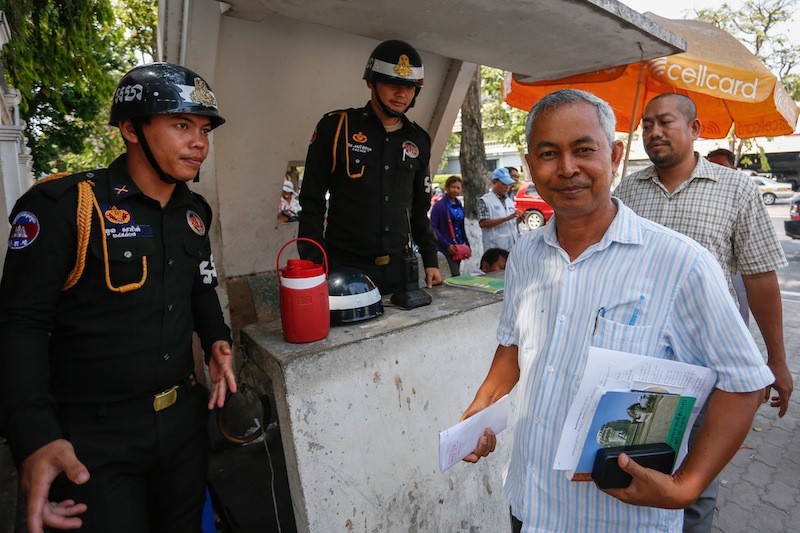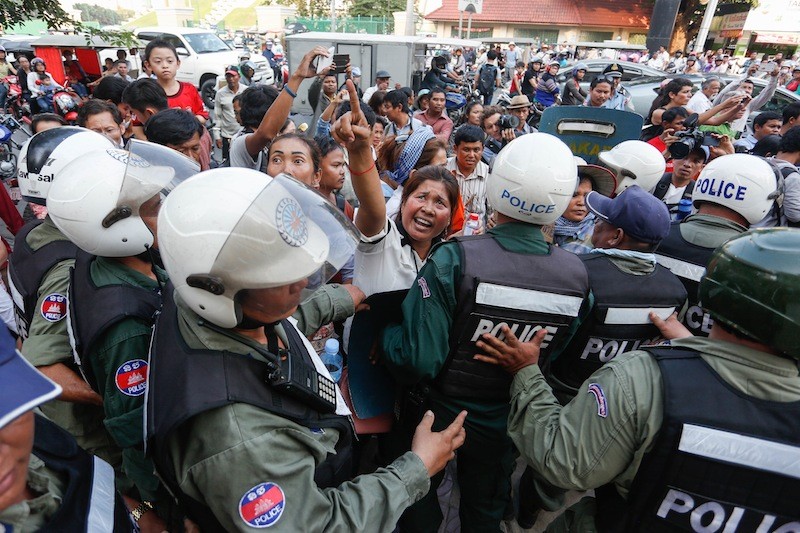The government on Sunday warned of a crackdown on activists and advocacy groups set to protest today against the recent arrests of four rights workers and an election official, calling the planned demonstration an act of “urban rebellion.”
The activists and organizations are calling for the release of the five, four of whom were sent to Phnom Penh’s Prey Sar prison on bribery charges last week for allegedly conspiring to pay a woman to deny an affair with CNRP Vice President Kem Sokha. The Anti-Corruption Unit (ACU) is investigating the allegations in a case widely thought to be politically motivated.

The activists called off a march to the ACU’s Phnom Penh headquarters on Saturday after City Hall forbade it. Now, backed by dozens of rights groups, they plan to rally outside Prey Sar this morning while symbolically clad in black.
In a statement posted to its website on Sunday, the Interior Ministry said the organizers were “inciting a ‘Black Monday Campaign’” and that authorities would “execute their roles and responsibilities” to enforce the law if the event went ahead as planned.
“Competent authorities at all levels,” it said, “will execute their roles and responsibilities to enforce the laws thoroughly with a view to maintaining peace, political stability and social order, and to strengthen the rule of law within the principles of a multiparty democracy.”
Officials at the Interior Ministry and National Police Commissariat could not be reached on Sunday. But government spokesman Phay Siphan likened the plans for a color-coordinated protest to a “color revolution,” which he said could not be tolerated.
“They want to disturb any function of the state institution,” he said. “That is the threat.”
“This is an urban rebellion act,” he added. “Why [do] they call to release them? Why [do] they put pressure on the court?”
Mr. Siphan said the protesters should channel their frustration through the court or the National Assembly. He said their choice of black was also a deliberate and unacceptable nod to Khmer Rouge uniforms.
“Why [do] they choose that color to do that?” he said. “It reminds the people [of] 1975, which took 2 million lives.”
But activists and rights groups planning to join the protest dismissed the government’s concerns of revolution as typical overreaction to dissent.
“This is not about revolution. This is to protest and ask for the release of the five,” said Ee Sarom, executive director of local housing rights group Sahmakum Teang Tnaut.
Mr. Sarom said his was one of about 30 NGOs, associations and community groups planning the demonstration and that he expected between 200 and 300 people to take part.
As for their decision to wear black, he said the color symbolized the dark pall falling over human rights in Cambodia.

“It is because we think our rights to assembly are abused and violated by the government,” he said. “It is…black [because] there is no more light in terms of our rights.”
Should police or soldiers try to stop them, he said, “it is clear that the government is trying to kill… human rights in Cambodia.”
Kem Sarann, a land rights activist, said the protesters would return to the prison every Monday until the group of five was released and that any attempt to stop them would only damage the government’s image in the eyes of voters and foreign donors alike.
“We will wear black to mourn the arrests,” she said. “Black means darkness and injustice for them. We will show the national and international organizations that Cambodia is now in darkness.”
The four imprisoned rights workers are all employees of local NGO Adhoc, a frequent critic of the government. Ny Chakrya, who was charged and jailed with them, is a deputy secretary-general of the National Election Committee and served as a top officer at Adhoc until taking up his current post in January. All have denied wrongdoing.
The case stems from leaked recordings of private telephone conversations purportedly between the CNRP’s Mr. Sokha and an alleged mistress. Mr. Sokha was summoned for questioning by the Phnom Penh Municipal Court on Wednesday over claims that he defamed a prominent youth activist in one of those conversations.
On Sunday, Ly Sophanna, a spokesman for the prosecutors, said the court had issued yet another summons for Mr. Sokha on Friday, but declined to elaborate. According to a copy of the summons posted online by Fresh News, Mr. Sokha is asked to appear on May 17 as a witness in a case involving the procurement of prostitution.
Mr. Sokha’s alleged mistress, Khom Chandaraty, was questioned over allegations of prostitution last month, but was not charged.
The CNRP has said that none of its lawmakers will heed court summonses unless their constitutionally guaranteed immunity is first stripped by two-thirds of the Senate or National Assembly. The Justice Ministry says immunity does not shield lawmakers from questioning.




